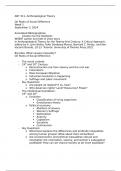Class notes
ANT 311: Anthropological Theory
- Course
- ANT 311
- Institution
- Syracuse University
Anthropological Theory is a required course for all Anthropology majors, as well as being recommended for minors. This document holds the notes covering the entire semester. As well as tips and tricks for understanding theory.
[Show more]



